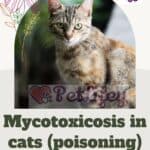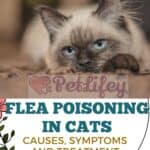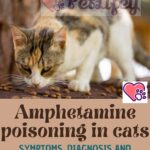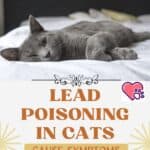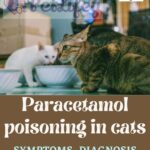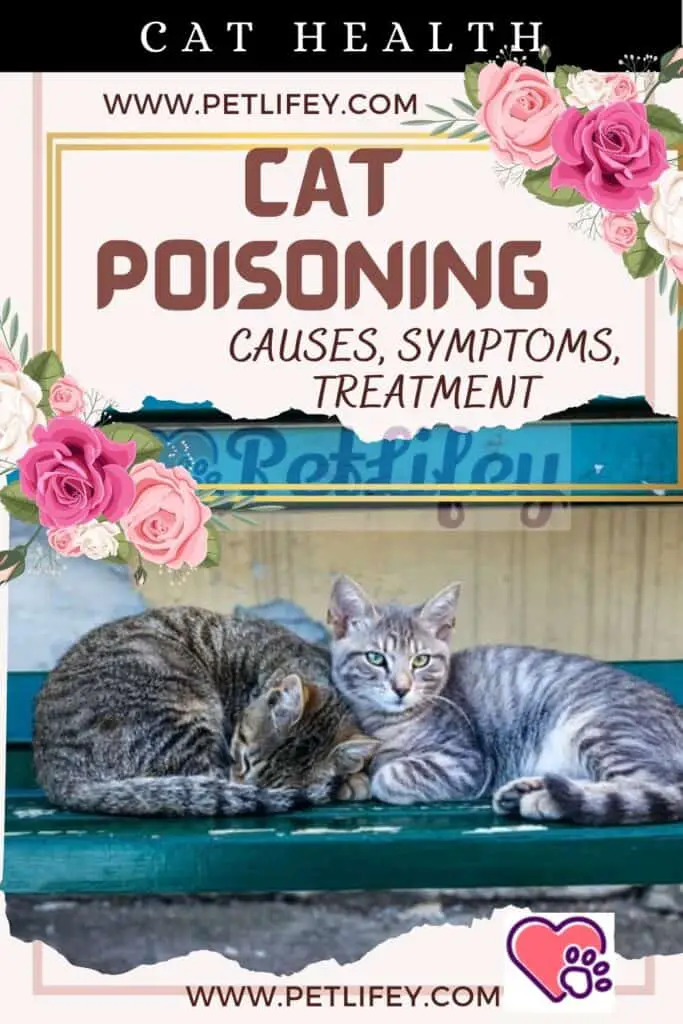
The causes of cat poisoning are numerous. When faced with a poisoned cat, it is not always easy to determine the cause, which is however useful for a quick and effective management of the present ailments. Let’s get to know the causes, symptoms, treatment and maybe some advice on how to avoid poisoning.
Harmless products for humans can often be responsible for poisoning a cat. But other risks of intoxication creep into our domestic cats, especially because they are very clean-natured animals, their concern for cleanliness leads them to lick many toxic products with which they come into contact with the tongue.
Poisoning (intoxication) in cats as in dog poisoning occurs when the animal is exposed to toxins or absorbs toxic substances, for example with intoxicated food. A toxin is a substance that seriously interferes with a cat’s metabolism.
Often even small amounts of poison are sufficient to trigger few symptoms and cause health problems in the cat. For larger amounts of poison and / or lack of treatment, the poisoning is dangerous for the cat.
Poisons are generally found almost everywhere in the environment. Cats often get poisoned because they nibble on poisonous plants. Many non-toxic substances for a cat pose a risk to human health, however some substances harmless to humans, food, poisonous herbs for cats or drugs can instead lead to severe poisoning for the animal.
What are the causes of cat poisoning?
Poisoning in cats can have several reasons, the specific causes are listed below:
- plant
For the cat that has the possibility of living outdoors, the problem of plant poisoning is born, which is most common in cats (dogs are less sensitive) and is due to lilies. The whole part of the plant is affected and the symptoms appear quickly (from a few minutes to a few hours). The cat therefore vomits, does not eat, depression, then urinary and neurological disorders.
Inside, plants from the Dracaena (or dragon trees) and ficus family are the most offending. The main symptoms are digestive. In most cases, the severity is moderate.
- pesticides and rat poison
There are mainly cases of chloralose poisoning which today is used as a rat poison and permethrin used as an insecticide, but also in some veterinary drugs for dogs. In the latter case, owners often make the mistake of applying the product to the cat or otherwise the animal licks a dog that has just been treated with a product suitable for its species. The main symptoms are neurological and evident tremors, but also hypersalivation and vomiting.
The prognosis is favourable if the animal is treated quickly. If you have made the mistake of applying permethrin to your cat, wash it immediately, the water will allow you to limit skin absorption. Anticoagulant rodenticides are also often ingested by our furry pets. Commonly called “rat killers”, these products cause bleeding throughout the body. The prognosis is favorable if it is possible to intervene in time.
- drugs used for human treatment
The main drug given voluntarily by owners to their sick cat is paracetamol. The cat is very sensitive to this drug and causes blood disorders: the blood can no longer carry oxygen to different parts of the body. The animal compensates by breathing faster, its heart beats fast, its mucous membranes turn blue. In high doses, the cat can fall into a coma and this inevitably leads to death.
Prognosis is always reserved, especially if symptoms evolve rapidly (24 hours). In most cases it is possible for the animal to die within 24 to 48 hours. If the animal survives for 3 days, the prognosis improves but it takes several weeks for the body to restore balance.
We also talk about the administration of aspirin, which can be used as an anti-platelet aggregation in the treatment of some heart diseases in cats, but poisoning the cat with aspirin is fatal in case of overdose or self-medication, as we could read in our article on aspirin for dogs.
Less frequently, poisonings with NSAIDs (non-steroidal anti-inflammatory drugs) such as ibuprofen are also described, but also antidepressants to cats and animals in general, they are toxic. There, it’s more like an animal looking in the medicine cabinet. These are therefore less frequent poisonings in cats.
- “human” toxic substances
Yes , some substances used by man can be ingested by our dear companions and cause great harm to him. We are thinking mainly of alcohol (less common in cats) and, increasingly widespread, cannabis. If a cat has had access to cannabis in any form and suddenly seems free of reactions, balance disturbances, dilated pupils, try to intervene quickly and consult your veterinarian.
Symptoms and how they manifest
Poisoning in cats can lead to various symptoms. Signs of poisoning depend on the type and amount of poison.
Symptoms of cat poisoning include:
- Vomiting, diarrhea in cats
- Increased salivation
- Drowsiness, insecurity when walking
- Cat tremor , cramps
- paralysis
- Particularly narrow or wide pupils
- Strong arousal and other behavioural problems in the cat
How are cat poisonings diagnosed?
If cat poisoning is suspected, a quick diagnosis by the veterinarian is important. Only then is timely and targeted treatment possible. If the cat owner is aware of the cause of the poisoning, he should inform the vet and, if necessary, bring samples (e.g. medicine box, unknown plant, bottle of detergent) with him.
The vet questions the pet owner about the cat’s complaints and closely monitors symptoms of poisoning. Based on the cat owner’s symptoms and advice, she can often identify the toxin and initiate quick treatment. Additionally, blood and saliva samples from the cat and vomit samples are helpful in diagnosing cat poisoning.
Special tests (e.g. High Performance Liquid Chromatography, HPLC) are possible to detect the toxin directly from the samples. For chronic poisoning, the vet uses techniques such as ultrasound to detect possible organ alterations. In addition, liver and kidney values indicate organ function in urinalysis and blood tests.
How can cat poisoning be treated?
Which therapy is effective for cat poisoning depends on the one hand on the type of poison, on the other hand, on the timing and manner in which it came into contact with the poison. Acute poisoning is an absolute emergency. In most cases, the vet makes sure that the poison is quickly removed from the cat’s body, either through a gastric lavage or with the help of medications. In addition, the doctor can also induce, through drugs, the cat to vomit.
Should poison be on the pet’s fur, thorough rinsing will help wash away the harmful substance. For some poisons, the cat’s doctor administers an “antidote,” an agent that limits or eliminates the effect of the poisonous substance. Depending on the nature of the poison and the damage, other treatments are important, such as washing or oxygenating the cat.
The prognosis of cat poisoning
How positive the prognosis for cat poisoning is cannot be established in general terms. Therefore, the prognosis for poisoning is based on:
- the age and general health of the cat
- the type of poison
- the amount of poison in relation to the size of the body
- the type of poison intake (e.g. eating, inhaling)
- the time between taking poison and treatment
- the treatment
The faster a cat is treated after poisoning, the better the prognosis. It is therefore important to take your cat to the vet as soon as possible.
How to prevent poisoning
Cat poisoning can only be partially avoided. Free-range cats can come into contact with poisons at any time, such as poisonous garden plants or poisoned bait. But indoor cats are also at risk of poisoning, such as toxic houseplants, detergents and solvents.
Often it is only his instinct that prevents the cat from receiving harmful substances. However, it is very important to pay attention to a few things to prevent cat poisoning:
- Essential oils in perfume lamps or personal care products can be toxic to cats, such as tea tree oil or cinnamon oil. Always keep it out of the reach of your cat.
- Medicines should be given to the cat only after consulting the veterinarian. The cat can only receive those medications that are approved for cats or that the veterinarian has expressly recommended.
- Some houseplants can cause poisoning in cats, including euphorbia, Dieffenbachia, calla, oleander, ivy, azaleas, conifers, daffodils, cyclamen.
- Household poisons for cats include cleaning products with phenol or cresol, naphtha pellets, lamp oil, turpentine, acids and alkalis.
Is it important to consult a veterinarian?
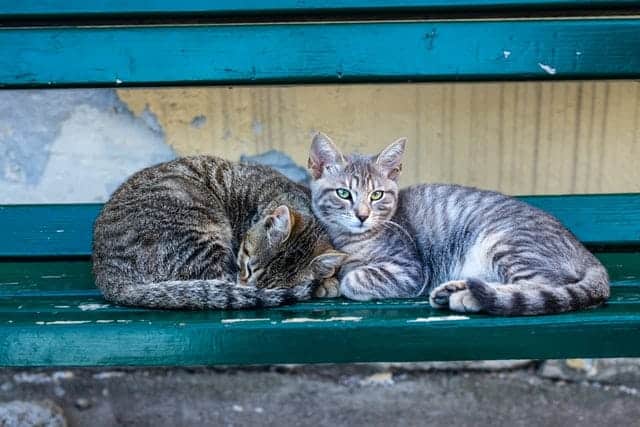
If poisoning is noticed in the cat, the pet owner should contact the veterinarian as soon as possible. Therefore, acute poisoning is considered an emergency. The more quickly you manage to intervene, the greater the chances of survival of the animal. Only in the case of a quick intervention of the specialist, can often avoid organ damage.
It is important not to believe that you can independently intervene in a cat poisoning, absolutely never treat it without consulting your vet. our attempt could only worsen the poisoning, at best. To facilitate the veterinarian’s diagnosis , it is advisable to describe what has been noticed in the animal, as accurately as possible and, if possible, to bring samples or the toxic element ingested.

